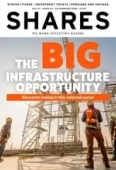Archived article
Please note that tax, investment, pension and ISA rules can change and the information and any views contained in this article may now be inaccurate.
Saba strikes out with trusts push and the energy implications of a Ukraine peace deal

All the meetings requisitioned by Saba at UK investment trusts are now done and dusted and the scorecard makes sobering reading for the US activist hedge fund – trusts seven, Saba nil.
That doesn’t mean there is room for complacency on the part of the investment trust industry, as Saba has shone a spotlight on issues around performance and persistent discounts to NAV (net asset value) which aren’t going away.
Given Saba still owns some significant stakes in a large number of trusts, they may well try again to push for change.
In this week’s issue we turn our attention to a separate part of the trusts universe and examine the particularly wide discounts in the infrastructure space. Martin Gamble’s excellent article shows how a takeover approach for BBGI Global Infrastructure (BBGI) at a premium to NAV has got that sector moving.
Also this week, you can read our latest My Portfolio offering, as Sarah explains why she decided to take her investment destiny into her own hands during the pandemic, and we preview a crunch set of earnings for Nvidia (NVDA:NASDAQ).
Another key development which we touch on in this issue is the start of negotiations over the Russia-Ukraine war and the implications this might have for European defence spending.
It could also have a significant bearing in another arena. Bank of America’s commodity and derivatives strategists Francisco Blanch says: ‘Negotiations to end the Russia-Ukraine war have started and, just like the war itself was a major event for global energy markets, a peace agreement, were it to occur, could also shake the world of commodities.’
Blanch notes that around half of European thermal fuel imports came from Russia before the war – encompassing 35% of the region’s coal, 35% of its crude and 77% of its natural gas.
‘As the war started, some energy was redirected away from Europe to Brazil or the Middle East, while some became stranded in Russia. Domestic production capacity also took a hit,’ Blanch says.
He goes on to observe ‘there are at least three channels from any potential sanctions relief on Russian energy that may contribute to more output and lower prices’.
‘First, trade routes may shrink, releasing operating energy storage into markets. Second, stranded energy could come back to the European market, releasing fresh supplies. And third, service companies could eventually boost Russian energy production capacity.’
If lower prices did materialise it could prove helpful in dialing down inflationary pressures, although obviously there is a long way to go in terms of a peace deal being achieved.
Important information:
These articles are provided by Shares magazine which is published by AJ Bell Media, a part of AJ Bell. Shares is not written by AJ Bell.
Shares is provided for your general information and use and is not a personal recommendation to invest. It is not intended to be relied upon by you in making or not making any investment decisions. The investments referred to in these articles will not be suitable for all investors. If in doubt please seek appropriate independent financial advice.
Investors acting on the information in these articles do so at their own risk and AJ Bell Media and its staff do not accept liability for losses suffered by investors as a result of their investment decisions.
Issue contents
Feature
Great Ideas
Investment Trusts
Money Matters
My Portfolio
News
- Airbnb shares enjoy record day after strong Q4 and growth initiative
- Strong regulatory tailwinds keep XPS Pensions in the ascendency
- Wood Group shares hit an all-time low after review and cash flow revelation
- Is the Rolls-Royce recovery complete?
- Market relaxed about outcome of crucial European poll for now
- UK and European defence stocks surge as governments mull security spending hike
 magazine
magazine








